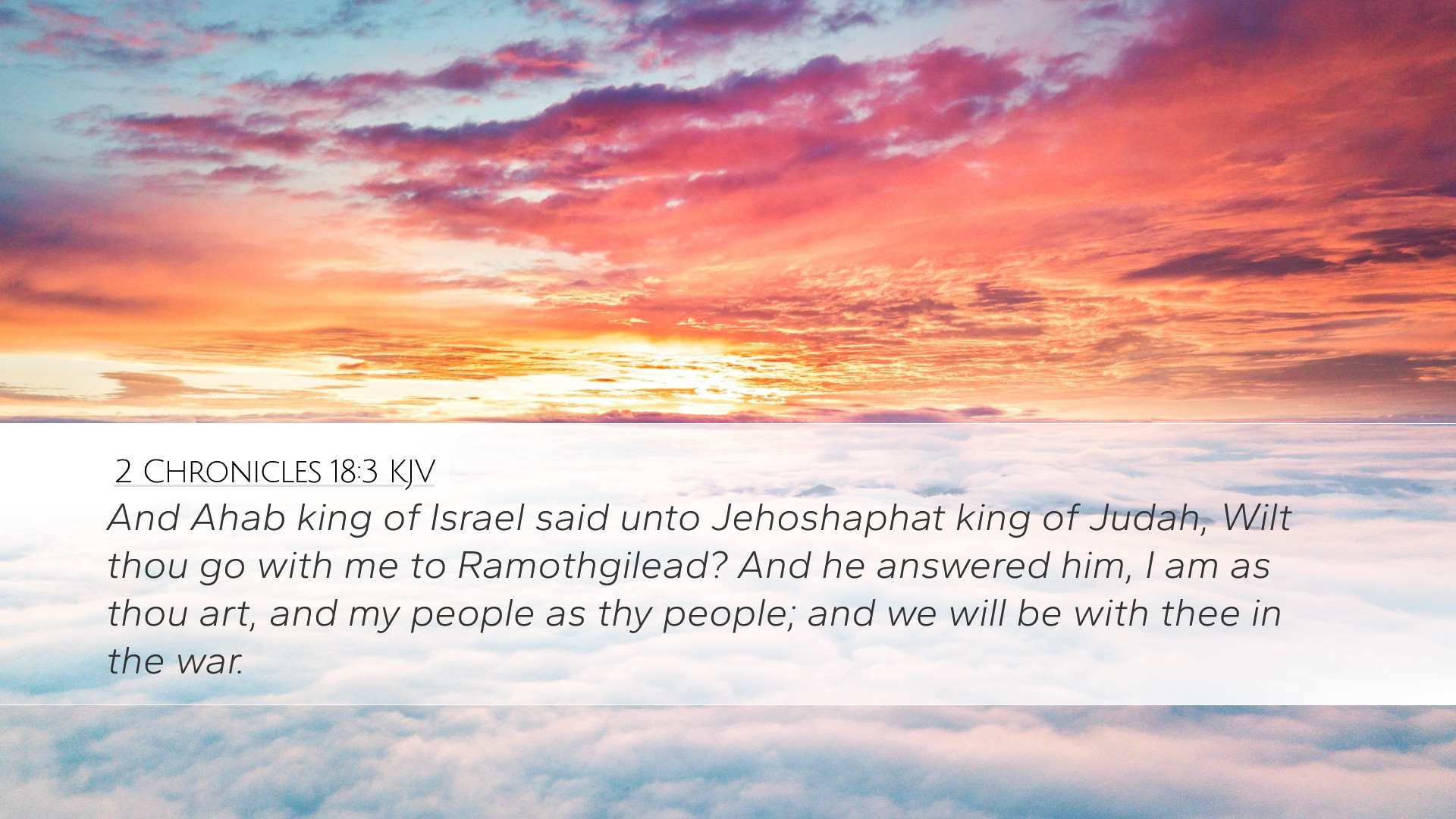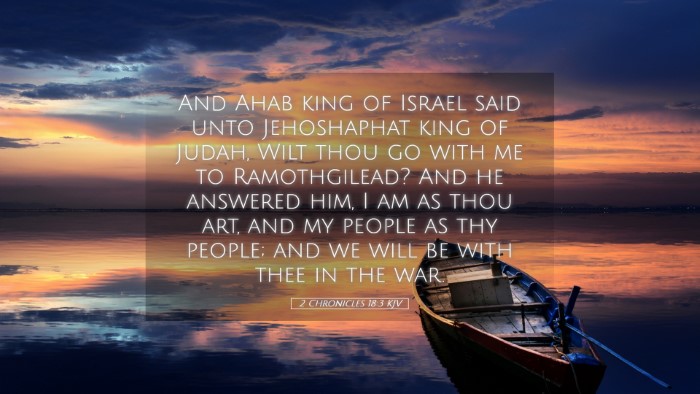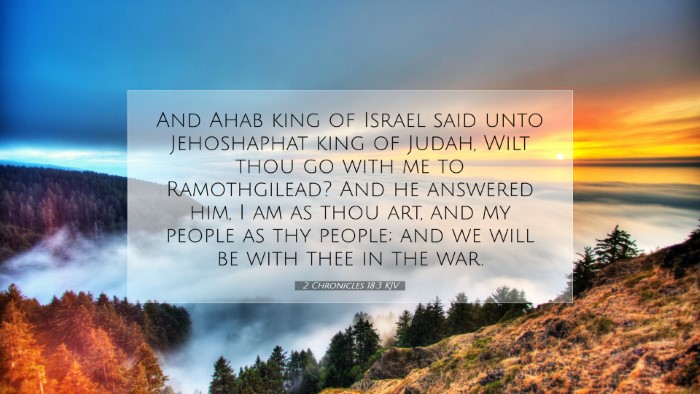Commentary on 2 Chronicles 18:3
Verse Reference: 2 Chronicles 18:3 - "And Ahab king of Israel said unto Jehoshaphat king of Judah, Wilt thou go with me to battle to Ramothgilead? And Jehoshaphat said to Ahab, I am as thou art, and my people as thy people; and we will be with thee in the war."
Introduction
This verse depicts a pivotal moment in the alliance between the Northern kingdom of Israel, led by King Ahab, and the Southern kingdom of Judah, governed by King Jehoshaphat. Their partnership, fraught with complexities, serves as a significant study in biblical leadership and the consequences of alliances.
Contextual Background
This account is situated within the narrative of the reigns of Ahab and Jehoshaphat. Ahab, known for his idolatrous practices and at odds with God, contrasts with the relatively more righteous Jehoshaphat. The historical context reveals a backdrop of military conflict, particularly concerning the city of Ramothgilead, which is significant for both kingdoms.
Insights from Matthew Henry's Commentary
Matthew Henry emphasizes the folly of Jehoshaphat's alliance with Ahab. He notes that despite Jehoshaphat’s good intentions and earlier reforms in Judah, his willingness to join in this military campaign with Ahab is concerning. Ahab's character is underscored here as one who does not seek the Lord, and Henry draws attention to the risk of righteous influences becoming tainted by evil associations.
Key points from Henry:
- Incompatibility of Principles: Henry highlights that Jehoshaphat’s statement, "I am as thou art," exposes the danger of compromising one’s values for political alliances.
- Shared Resources: Ahab's request reflects a common practice where kings sought the support and strength of allied forces; however, it is critical to discern the spiritual implications of such actions.
- Enthusiasm for War: The eagerness shown by both kings to engage in battle indicates a shared ambition, but it raises questions about their motivations and the righteousness of their cause.
Reflections from Albert Barnes' Commentary
Albert Barnes offers insight into the political dynamics at play. He denotes the strategic reasoning behind Jehoshaphat’s acceptance, accentuating that alliances often served a national interest, but warns about the moral costs. Jehoshaphat's response, while outwardly loyal, contains implications of deep-seated issues, including accountability to God.
Important observations from Barnes:
- The Role of Prophets: Barnes encourages examining the involvement of prophetic voices in discernment for such alliances and suggests that Jehoshaphat should have sought the Lord before agreeing to such a partnership.
- Nations and Identity: The phrase "I am as thou art" suggests a problematic merging of identities, where spiritual distinctions may be compromised for the sake of political unity.
- Consequences of Alliances: The outcome of this collaboration is explored in the broader narrative, revealing moral and spiritual decay for Judah as it aligns more closely with Israel’s ungodliness.
Analysis through Adam Clarke's Lens
Adam Clarke delves into the textual nuances, interpreting Jehoshaphat’s words as both an expression of loyalty and an understatement of the gravity of the situation. He suggests that Jehoshaphat, though he claimed equality, may not have fully grasped the implications of Ahab’s leadership and the consequence of this military endeavor.
Clarke's critical thoughts include:
- Warning Against Compromise: Clarke explicitly warns against the dangers of compromising one's spiritual integrity for the sake of friendships or alliances.
- Understanding Context: He points out that decisions should not be based on political loyalty alone but rather on divine wisdom and guidance.
- The Nature of Conflict: The broader implications of such engagements in battles are explored, highlighting that spiritual warfare is often reflected in physical confrontations.
Theological Implications
This verse and its surrounding context bring several theological themes to light:
- The principle of divine consultation: The narrative invites leaders to consider first consulting God, especially in matters of alliance.
- Trust in God versus Human Alliances: It calls into question the reliance on human means over divine protection and guidance.
- The moral implications of leadership: The decision-making processes of leaders reflect their spiritual health and impact on their nations.
Conclusion
2 Chronicles 18:3 stands as a vital examination of civic responsibility, spiritual integrity, and the consequences of leadership decisions. The interplay between Ahab and Jehoshaphat urges modern readers, including pastors, students, and scholars, to evaluate their commitments and alliances critically. In today’s context, as we navigate complex social and political landscapes, it remains essential to seek divine wisdom and uphold our spiritual values amidst external pressures.


